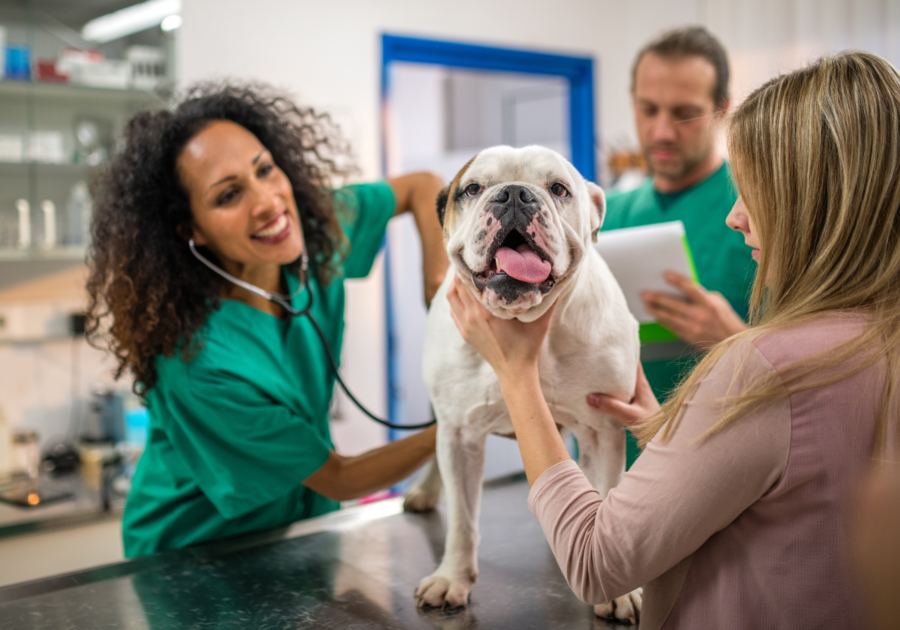The Roanoke Valley SPCA and Virginia Tech Launch Innovative Partnership to Shape the Future of Animal Behavioral Programming in Shelter Medicine
Aimed at boosting shelter animal adoptions and welfare locally and nationally, the partnership offers hands-on learning and research opportunities for faculty and students.
A novel partnership between the Roanoke Valley SPCA and Virginia Tech’s School of Animal Sciences aims to improve shelter animals’ well-being and adoption success while providing hands-on learning and research opportunities for faculty and students.
The collaboration will be led by Megan Arant, a new School of Animal Sciences faculty member, who will split her time between the Roanoke Valley SPCA and Virginia Tech. Arant, an expert in animal behavior and welfare, will work with shelter pets on positive behavioral interventions, and lead classes and student research activities focused on improving shelter animal behavior and welfare.
“Animal shelters nationwide are currently overflowing, and our communities aren’t immune to the increasing demand,” said Roanoke Valley SPCA Chief Executive Officer Denise Hayes. “Too often, pets are surrendered or experience a delayed adoption due to fixable behavioral challenges. Not addressing those challenges often results in a prolonged shelter stay, which can worsen anxiety and resulting behaviors. We are thrilled to partner with Virginia Tech to break this cycle, improving the well-being of our local pets, sharing findings with peers, and establishing cutting-edge best practices to improve shelter animal well-being across the country.”
As many as half of all animals in shelters are surrendered for behavioral reasons – the majority of which can be solved through simple training techniques. In her role as behavioral support services director at the Roanoke Valley SPCA, Arant will incorporate a “Fear-Free” approach that helps pets work through behavior difficulties in a positive manner, making them more adoptable. She will also oversee, develop, and implement behavior programs, services, and guidelines for the shelter.
In her dual role as companion animal project and research coordinator at Virginia Tech, Arant will teach and mentor students in both the shelter and the classroom.
“I’m excited to help bridge the gap between classroom and experiential learning,” Arant said. “Students will learn critical handling and behavioral skills and the shelter animals will benefit greatly from these interactions.”
More than 6 million animals enter U.S. shelters every year, according to the ASPCA. The School of Animal Sciences has several ongoing shelter-based research projects intended to make animals’ stays more enjoyable, including studying the effects of sound-masking
and the use of automated feeders to reduce noise levels and stress in dog kennels. Previous efforts have shown the benefits of temporary fostering, “field trips,” and co housing on shelter dogs.
“This partnership gives our students the opportunity they have been craving to work hands-on with companion animals in a meaningful way that enhances student learning and animal welfare,” said Erica Feuerbacher, associate professor of applied animal behavior and welfare in the College of Agriculture and Life Sciences. “Partnering with the Roanoke Valley SPCA, a progressive, forward-thinking organization, we will be able to conduct and share research that can be applied broadly to improve the well-being and adoption outcomes of shelter animals everywhere.”
Yasmeen Gomez ’24, a master’s student studying applied animal behavior, says she looks forward to participating in research that has the potential to make life better for animals in shelters nationwide.
“Animals in general provide such a benefit to us as humans – service, companionship, emotional support,” she said. “It’s our duty to provide it back to them where we can.”
For more information about the Roanoke Valley SPCA, please contact Julie Rickmond, marketing and communications director, at 540-339-9513 or jrickmond@rvspca.org.
For more information about Virginia Tech’s School of Animal Sciences, contact Tom Soladay, director of communications in the College of Agriculture and Life Sciences, at 540-232-2501 or tsoladay@vt.edu.
About the Roanoke Valley SPCA
Since 1916, the Roanoke Valley SPCA has provided a safe environment for lost, abandoned, and homeless animals. Over 25,000 cats and dogs have been
The Roanoke Valley SPCA is a community resource that provides pet adoption, retention, and education services in Virginia’s Blue Ridge.
1340 Baldwin Avenue, Roanoke VA 24012 P: (540) 339-9247 | F: (540) 342-6730 www.rvspca.org
adopted since opening our new building in 2004. Annually we provide food, shelter, rehabilitation, and medical treatment for over 1,500 homeless animals, ensuring they are altered, microchipped, and healthy prior to adoption. Our Pets Eat Too program feeds the pets of homebound seniors receiving Meals on Wheels as well as hospice patients, local food pantry participants, and families struggling to feed their pets, distributing over 80,000 pounds of food annually. Transportation services provide access to veterinary care and spay/neuter services throughout our community and we have expanded our offerings to include transitional fostering of pets whose owners are fleeing domestic violence, may be experiencing temporary homelessness due to fire, or need to spend time in a rehabilitation center following surgery.
About Virginia Tech’s School of Animal Science
Virginia Tech’s School of Animal Sciences is one of the largest animal sciences programs east of the Mississippi, with more than 700 current students preparing for careers in agriculture, medicine, veterinary sciences, biotechnology, and other highly rewarding professions. Ranked second nationally in the number of federal research grants obtained, the School of Animal Sciences is dedicated to advancing animal health, productivity, and translational science to meet the challenges of a growing world population.



